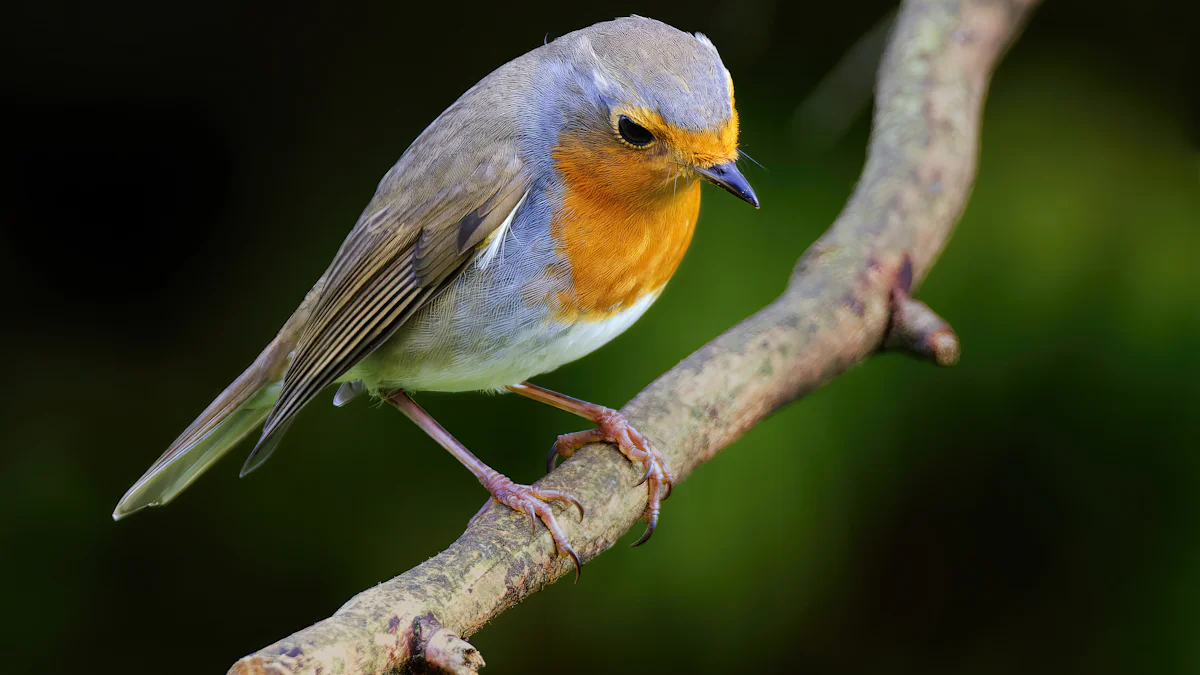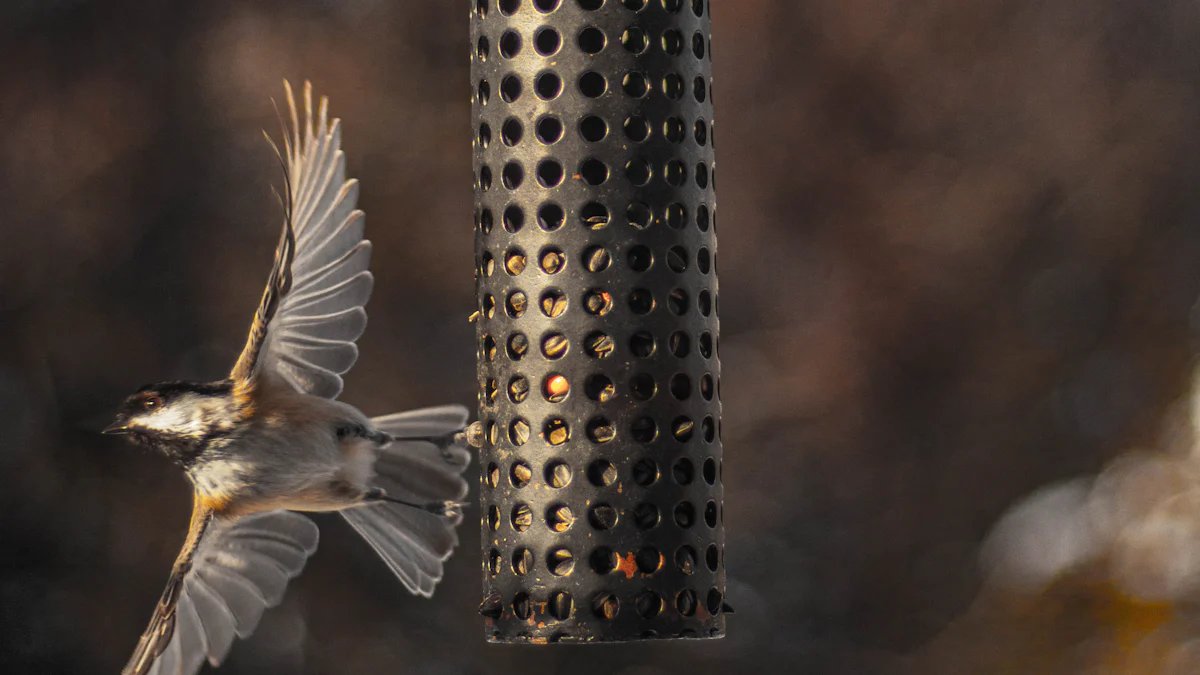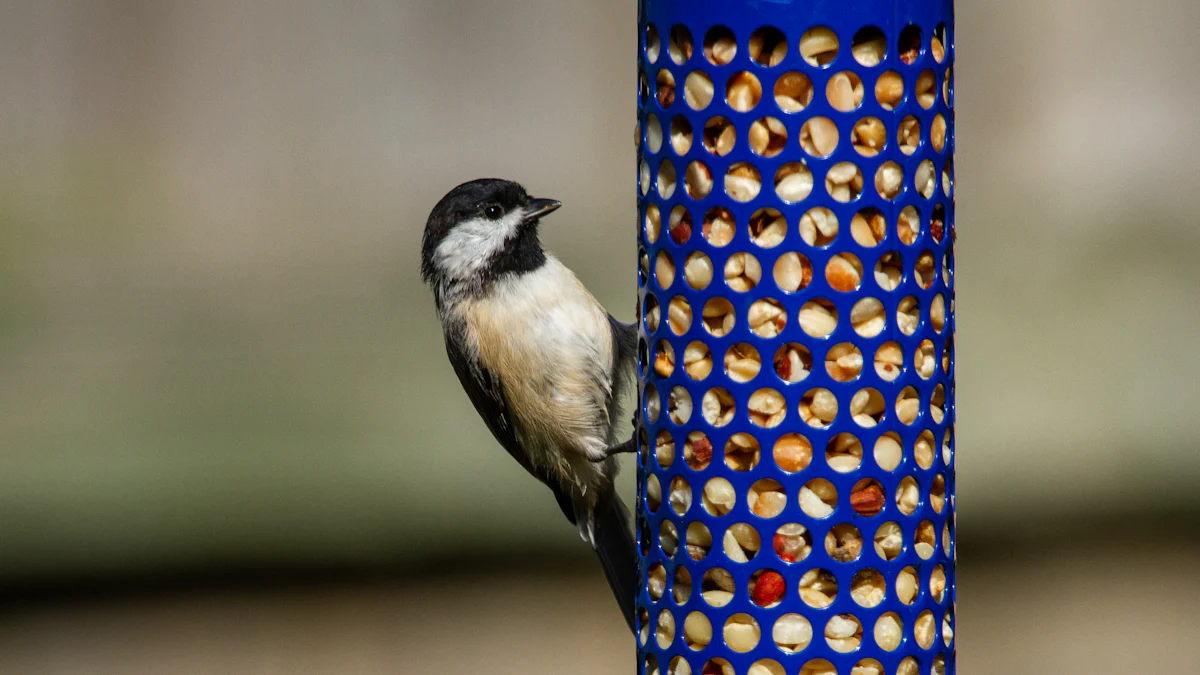
Birds thrive when their diet includes nutrient-rich options, and dried mealworms stand out as a remarkable choice. Packed with protein, healthy fats, and essential vitamins, these tiny larvae provide the building blocks for muscle growth, feather development, and sustained energy. Unlike traditional feeds, mealworms offer superior digestibility, ensuring birds absorb maximum nutrients. Their convenience and long shelf life make them an ideal option for bird enthusiasts. Additionally, the rising popularity of feeding dried mealworms to birds reflects a shift toward sustainable and eco-friendly practices, benefiting both your feathered friends and the planet.
Key Takeaways
- Dried mealworms are a nutrient powerhouse, offering high levels of protein (47-60%) and healthy fats (31-43%) that support muscle growth and energy levels in birds.
- Mealworms are highly digestible, allowing birds to efficiently absorb essential nutrients without straining their digestive systems, making them a superior choice compared to traditional feeds.
- Incorporating mealworms into your bird’s diet enhances feather quality and overall health, thanks to their rich content of essential amino acids and fatty acids.
- Feeding mealworms can significantly boost your birds’ energy levels, especially during breeding seasons or colder months, promoting increased activity and vitality.
- Mealworms are an eco-friendly and sustainable food source, requiring fewer resources to produce compared to traditional livestock, thus benefiting the environment.
- To ensure your birds’ health, introduce mealworms gradually and maintain a balanced diet by combining them with other foods like seeds and fruits.
- Dried mealworms are cost-effective, with a long shelf life, providing excellent nutritional value while reducing overall feeding costs for bird owners.
Nutritional Composition of Mealworms

Mealworms are a powerhouse of nutrition, offering birds the essential nutrients they need to thrive. By incorporating mealworms into your bird’s diet, you provide them with a balanced and nutrient-rich food source that supports their overall health and vitality.
Protein Content and Amino Acid Profile
Protein is the cornerstone of a bird’s diet, and mealworms deliver it in abundance. With a crude protein content ranging from 47% to 60%, mealworms surpass many traditional feed options. This high protein level promotes muscle development, tissue repair, and overall growth in birds. Additionally, mealworms boast an impressive amino acid profile, including essential amino acids like lysine and methionine. These amino acids play a critical role in feather formation, enzyme production, and maintaining a strong immune system.
"Every 100 grams of raw mealworm larvae provide 14 to 25 grams of protein, making them an exceptional protein source for birds."
When you choose mealworms, you ensure your birds receive a protein-packed diet that fuels their energy and enhances their physical well-being.
Fat Content and Energy Value
Mealworms are not just rich in protein; they also provide a significant amount of healthy fats. These fats, which make up 31% to 43% of their composition, serve as a concentrated energy source for birds. The energy derived from these fats helps birds maintain their activity levels, especially during colder months or breeding seasons when their energy demands increase.
The fats in mealworms include essential linoleic acids, which contribute to healthy skin and vibrant plumage. By feeding dried mealworms to birds, you give them the energy they need to stay active and the nutrients required for a glossy, healthy appearance.
Vitamins and Minerals
Mealworms are a treasure trove of vitamins and minerals that support various aspects of bird health. They contain vital nutrients such as:
- Vitamin E: Boosts the immune system and protects cells from oxidative stress.
- Iron: Supports oxygen transport in the blood, ensuring birds remain energetic and active.
- Calcium: Strengthens bones and aids in eggshell formation for breeding birds.
- Potassium: Regulates fluid balance and supports muscle function.
These nutrients work together to enhance your bird’s overall vitality. Feeding dried mealworms to birds ensures they receive a well-rounded diet that meets their nutritional needs.
Digestibility of Mealworms for Birds
How Birds Process Mealworms
Birds digest mealworms with remarkable efficiency, making them an excellent addition to their diet. The soft exoskeleton of mealworms, primarily composed of chitin, is easier for birds to break down compared to the tougher shells of other insects. This allows birds to extract nutrients like protein, fats, and essential vitamins without unnecessary strain on their digestive systems.
Mealworms also have a high protein digestibility score, meaning birds can absorb and utilize the majority of the protein they consume. This efficient nutrient absorption supports muscle growth, energy production, and overall vitality. Unlike some traditional feeds, mealworms do not leave behind indigestible residues, ensuring your birds get the most out of every bite.
When you feed dried mealworms to birds, you provide them with a food source that aligns perfectly with their natural digestive capabilities. This makes mealworms not only a nutritious choice but also a practical one for maintaining your birds’ health.
Comparison with Other Feed Options
Mealworms stand out when compared to other common bird feed options like soy, wheat bran, or maize. Their superior nutritional profile and digestibility make them a game-changer for bird enthusiasts. Here’s how mealworms compare:
- Protein Content: Mealworms contain up to 48% protein, surpassing soy and other plant-based feeds. This high protein level supports muscle development and feather growth more effectively than many traditional options.
- Energy Value: The healthy fats in mealworms provide a concentrated energy source, which is especially beneficial during colder months or breeding seasons. Soy and maize, while energy-rich, lack the essential fatty acids found in mealworms.
- Digestibility: Birds process mealworms more efficiently than feeds like wheat bran or maize stover. The high digestibility ensures maximum nutrient absorption, reducing waste and improving overall health.
- Sustainability: Mealworms require less water and land to produce compared to crops like soy. This makes them an eco-friendly choice for bird owners who care about sustainability.
"Dried mealworms offer a unique combination of high protein, essential fats, and digestibility, making them a superior alternative to traditional bird feeds."
By choosing mealworms over conventional options, you provide your birds with a nutrient-dense, easily digestible, and environmentally friendly food source. This choice not only benefits your birds but also contributes to a more sustainable future.
Health Benefits of Feeding Dried Mealworms To Birds

Improved Energy Levels and Activity
Feeding dried mealworms to birds provides them with a rich source of energy. The high-fat content in mealworms acts as a concentrated energy reserve, fueling birds during periods of increased activity. Whether it’s the bustling breeding season or the harsh winter months, mealworms help birds maintain their stamina and vitality.
Birds that consume mealworms often display heightened activity levels. They fly longer distances, forage more efficiently, and exhibit livelier behaviors. This boost in energy ensures they can meet the demands of their daily lives, from finding food to caring for their young. By incorporating mealworms into their diet, you empower your feathered friends to thrive in any environment.
"Mealworms are a great supplemental food for birds due to their high nutritional content, providing protein and fat essential for their diet." – Uncle Jim’s Worm Farm
Feather Quality and Plumage Health
A bird’s feathers are not just for flight; they are a reflection of its overall health. Mealworms, rich in essential fatty acids and amino acids, play a pivotal role in enhancing feather quality. These nutrients contribute to the development of strong, vibrant plumage that protects birds from the elements and aids in attracting mates.
The linoleic acids found in mealworms promote healthy skin, which directly impacts feather growth. Birds fed with mealworms often exhibit glossy, well-maintained plumage. This improvement in feather condition not only boosts their appearance but also enhances their ability to regulate body temperature and stay agile in flight. By feeding dried mealworms to birds, you ensure they maintain their natural beauty and resilience.
Immune System Support
A robust immune system is vital for birds to fend off diseases and infections. Mealworms provide a wealth of vitamins and minerals, such as Vitamin E, iron, and calcium, which strengthen the immune response. Vitamin E, in particular, acts as a powerful antioxidant, protecting cells from damage and supporting overall health.
Iron enhances oxygen transport in the blood, keeping birds energetic and active. Calcium contributes to bone strength and aids in the production of healthy eggshells for breeding birds. These nutrients work together to fortify the bird’s immune defenses, ensuring they remain healthy and vibrant. By adding mealworms to their diet, you give your birds the tools they need to stay strong and resilient.
"Mealworms are rich in protein, healthy fats, vitamins, and minerals that support birds’ immune systems and overall health." – SXDXHFC News
Potential Risks and How to Mitigate Them
While dried mealworms offer numerous benefits for birds, it’s essential to understand potential risks and how to address them. By taking simple precautions, you can ensure your birds enjoy the nutritional advantages of mealworms without compromising their health.
Allergen Concerns
Some birds may develop allergic reactions to mealworms. These reactions often stem from the proteins in the mealworms or their chitin-rich exoskeletons. Allergies can manifest as digestive discomfort, changes in behavior, or even respiratory issues in sensitive birds.
To minimize this risk:
- Introduce mealworms gradually: Start with small amounts and observe your birds for any adverse reactions.
- Diversify their diet: Avoid relying solely on mealworms. A varied diet reduces the likelihood of overexposure to potential allergens.
- Consult a veterinarian: If you notice unusual symptoms, seek professional advice to confirm and address any allergies.
By monitoring your birds closely, you can identify and manage any sensitivities early, ensuring their continued well-being.
Contamination Risks
Mealworms, like any food source, can carry microbiological hazards if not handled or stored properly. Contaminants such as bacteria, fungi, or pesticides may pose health risks to your birds.
To safeguard against contamination:
- Choose high-quality mealworms: Purchase from reputable suppliers who follow strict hygiene and safety standards.
- Store mealworms correctly: Keep them in a cool, dry place to prevent mold growth or spoilage.
- Use heat-treated mealworms: Heat treatments eliminate harmful microorganisms, making the mealworms safer for consumption.
"Safety aspects may be guaranteed by heat treatments and additional hygiene practices." – Microbiological Safety of Edible Insects
By prioritizing cleanliness and proper storage, you can protect your birds from potential contaminants and ensure they receive safe, nutritious food.
Overfeeding and Nutritional Imbalance
Although mealworms are nutrient-dense, overfeeding can lead to imbalances in your bird’s diet. Excessive consumption of mealworms may result in weight gain, reduced appetite for other foods, or deficiencies in essential nutrients not found in mealworms.
To prevent overfeeding:
- Follow portion guidelines: Limit mealworms to a treat or supplement, comprising no more than 10-15% of your bird’s overall diet.
- Balance with other foods: Include seeds, fruits, and vegetables to provide a complete range of nutrients.
- Monitor your bird’s weight and behavior: Adjust feeding quantities if you notice changes in activity levels or body condition.
By offering mealworms in moderation, you can maintain a balanced diet that supports your bird’s health and vitality.
Understanding these potential risks allows you to make informed decisions when feeding dried mealworms to your birds. With careful management, you can maximize the benefits while minimizing any drawbacks, ensuring your feathered companions thrive.
Environmental and Economic Advantages of Feeding Dried Mealworms To Birds
Sustainability of Mealworm Farming
Mealworm farming represents a groundbreaking step toward sustainable food production. Unlike traditional livestock farming, which demands vast amounts of water, land, and feed, mealworms thrive on minimal resources. They efficiently convert organic by-products, such as vegetable scraps or grain residues, into high-quality protein. This process reduces food waste while creating a valuable resource for bird feeding.
Mealworms also produce significantly fewer greenhouse gas emissions compared to cattle or poultry farming. According to studies, their farming contributes to a circular food system, where waste materials are repurposed into nutritious biomass. By choosing mealworms, you actively support an eco-friendly alternative that minimizes environmental impact and promotes resource efficiency.
"Mealworms have the potential to reduce food-related greenhouse gas emissions and contribute to sustainable protein production." – pmc.ncbi.nlm.nih.gov
When you feed dried mealworms to birds, you’re not just nourishing them. You’re also making a conscious choice to protect the planet and embrace a more sustainable future.
Cost-Effectiveness for Bird Owners
Feeding birds can sometimes strain your budget, especially when relying on premium seeds or specialized feeds. Dried mealworms, however, offer an affordable and nutrient-dense solution. Their long shelf life ensures you get value for your money, as they remain fresh and usable for extended periods without refrigeration.
Mealworm farming’s efficiency also translates into lower production costs, making them an economical option for bird owners. Studies highlight the importance of improving affordability to establish mealworms as a viable alternative. As demand grows, prices continue to stabilize, ensuring accessibility for bird enthusiasts like you.
Additionally, mealworms’ high nutritional value means you can use smaller quantities to achieve the same health benefits as larger portions of traditional feed. This efficiency reduces overall feeding costs while providing your birds with superior nutrition.
"Mealworms are a low-cost, sustainable protein source with immense potential for bird feeding practices." – Springer
By incorporating mealworms into your bird’s diet, you save money while ensuring they receive the best possible care. It’s a win-win for both your wallet and your feathered friends.
Dried mealworms offer unmatched nutritional and digestibility benefits for birds. Their high protein content, essential fats, and vital vitamins make them a powerhouse of health, supporting energy, feather quality, and immune strength. By addressing potential risks like overfeeding or contamination, you can ensure your birds enjoy these benefits safely. Feeding dried mealworms to birds not only enhances their well-being but also promotes sustainability. By choosing this eco-friendly option, you contribute to a healthier planet while providing your feathered companions with the nourishment they deserve.
FAQ
What are the benefits of mealworms as bird food?
Mealworms provide an exceptional source of nutrition for birds. They are rich in protein and essential nutrients that support bird health and vitality. By adding mealworms to your birdfeeding routine, you can attract a variety of bird species to your yard. Mealworms are especially beneficial during breeding seasons when birds need extra energy and nutrients to thrive.
"Mealworms are a high-protein treat that supports muscle growth, feather development, and overall health in birds."
Which birds can be attracted to feeders with mealworms?
Mealworms are a magnet for many bird species. You can attract birds like American Robins, Blackbirds, Cardinals, Chickadees, Finches, Grackles, Nuthatches, Orioles, and Sparrows. These birds are drawn to the high nutritional value of mealworms, making them a favorite addition to backyard feeders.
What do mealworms provide as a treat for birds?
Mealworms, the larvae of the mealworm beetle (Tenebrio molitor), are a protein-packed treat that birds love. Species such as chickadees, titmice, wrens, and nuthatches relish mealworms. They are also one of the few food items that reliably attract bluebirds, making them a unique and valuable addition to your birdfeeding efforts.
How should I feed mealworms to birds?
You can offer mealworms in a shallow dish or specialized feeder. Place the feeder in a visible and accessible location to encourage birds to visit. Start with small amounts to gauge interest and gradually increase the quantity as more birds discover the treat. Always ensure the feeder is clean and free from mold or debris.
Are dried mealworms better than live ones?
Dried mealworms are more convenient and have a longer shelf life compared to live ones. They are easy to store and handle, making them a practical choice for bird enthusiasts. Live mealworms, however, may appeal more to certain bird species due to their movement. Both options provide excellent nutrition, so the choice depends on your preference and the birds you aim to attract.
Can mealworms replace a bird’s regular diet?
Mealworms should complement, not replace, a bird’s regular diet. They are a nutritious supplement that provides protein and energy but lack some essential nutrients found in seeds, fruits, and vegetables. Aim to offer mealworms as a treat or part of a balanced feeding plan to ensure your birds receive a complete range of nutrients.
How often should I feed mealworms to birds?
Feed mealworms to birds in moderation. Limit them to 10-15% of the bird’s overall diet. Offering mealworms a few times a week is sufficient to provide nutritional benefits without causing overfeeding or dietary imbalances. Adjust the frequency based on the season and the birds’ activity levels.
Are mealworms safe for all birds?
Mealworms are safe for most bird species, but some birds may have sensitivities or allergies. Introduce mealworms gradually and observe your birds for any unusual reactions. If you notice changes in behavior or health, consult a veterinarian for guidance. Always source mealworms from reputable suppliers to ensure they are free from contaminants.
How can I store dried mealworms?
Store dried mealworms in a cool, dry place to maintain their freshness. Use an airtight container to prevent moisture and pests from spoiling the mealworms. Proper storage ensures they remain safe and nutritious for your birds.
Why are mealworms considered eco-friendly?
Mealworms are a sustainable food source. Farming them requires minimal water, land, and resources compared to traditional livestock. They also produce fewer greenhouse gas emissions, making them an environmentally friendly choice. By feeding mealworms to birds, you contribute to a greener planet while supporting your feathered friends.
"Choosing mealworms as bird food aligns with eco-conscious practices, benefiting both birds and the environment."


